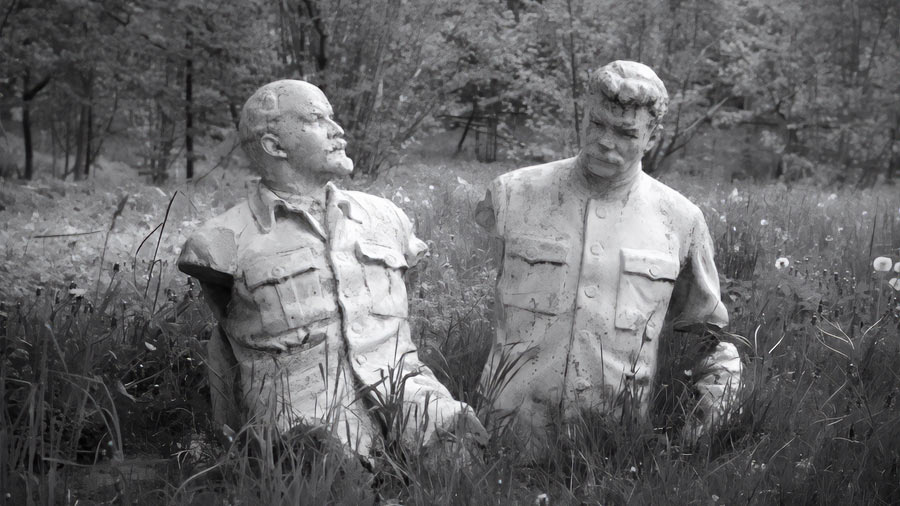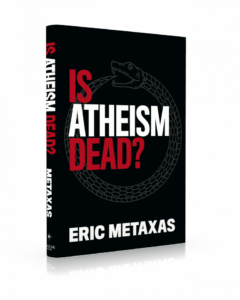Eric Metaxas Dances on Atheism’s Grave

If you’re an Eric Metaxas fan, you’re going to love his new book, Is Atheism Dead? which just hit bookstores. It delivers everything Metaxas is famous for — intelligence, humor, sarcasm, and even a touch of gravitas at just the right moments. Metaxas is a great storyteller as his past books so admirably demonstrate. And this book is no exception.
Some of the stories told here are jaw-dropping and are already receiving tremendous attention from the media. Newsweek published an excerpt from the book on the stunning discovery of biblical Sodom. Scientists confirmed that the city was indeed destroyed by fire — but in a most extraordinary, even supernatural way. The city was vaporized instantly. Read the riveting Metaxas account for details. It confirms the accuracy of the biblical story. Our focus, here however, is not on this story, but on another, perhaps less sensational, that will likely fly under the media radar.
The Unbearable, Restless Human Heart
Have you heard about the Christian conversions of existentialist writers Jean-Paul Sartre and Albert Camus? Probably not, unless you’ve read this book. At the heart of both these conversions is the experience of emptiness that both of these great writers felt in a world without God. Here is one of Camus’ key insights into his existential crisis, courtesy of Metaxas:
Something is dreadfully wrong. I am a disillusioned and exhausted man. I have lost faith, lost hope …. Is it any wonder that at my age, I am looking for something to believe in? To lose one’s life is only a little thing. But, to lose the meaning of life, to see our reasoning disappear, is unbearable. It is impossible to live a life without meaning.
Sartre’s Death-Bed Conversion
Turning to Sartre, Metaxas tells us that the French atheist came into the Church on his deathbed after confessing his sins to a priest. Now let’s be perfectly candid about something. Atheists hate these conversion stories. They really hate the deathbed variety. According to Metaxas, Simone de Beauvoir called her famous lover’s conversion “an act of senility.” Others see “last-breath” conversions as an act of cowardice. When Christopher Hitchens was dying of cancer, he dismissed any possibility of his own deathbed conversion. He said he would never take solace from Christianity’s “false consolations.” 
How do we respond? By asking an important question that doesn’t get asked often enough. What makes atheists such experts on the subject of human happiness? The Metaxas account of Sartre’s and Camus’ unhappy lives suggests they are no such thing.
Harvard Study: Depression Is a Feature, Not a Bug, of Atheism
Consider this recent Harvard study. It appeared in JAMA Psychiatry in 2016, and is the subject of this month’s cover story for Christianity Today. Nearly 70,000 American nurses were studied over a fifteen-year period. The study showed that those who didn’t go to church were five times more likely to commit suicide compared to those that attended church services regularly. The authors suggested that the connection was likely a causal one — and they should know. One of the researchers, Tyler VanderWeele, literally wrote the book on causation. They found that factors which likely contributed to the increased risk for the nonreligious included their higher rates of depression, divorce, and alcohol consumption.
Here is Dr. VanderWeele’s conclusion from Christianity Today:
Our own research indicates that declining religious service attendance accounts for about 40 percent of the rise in suicide rates over the past 15 years. If the declines in attendance could have been prevented, how many lives could have been saved?
Shattering the Shibboleths
VanderWeele makes another important point in the Christianity Today article. Many studies corroborate the findings of the Nurses’ Study linking religious practice to mental health, and “many of these findings are now considered well-established.”
Here would be a good place to remind ourselves that it was none other than the father of psychology himself who warned us of the “danger” posed by Christianity to mental health. The atheist Sigmund Freud identified Christianity as a principal source of neurosis and unhappiness. How wrong can you be? This point was not lost on Harvard Medical School Professor Marcia Angell when she blamed the present mental illness epidemic on bad psychology. Yet Christopher Hitchens cited the empirically discredited Freud no less than eight times in his atheist hatchet job, God Is Not Great. Here is Metaxas’ sober review of Hitchens’s book:
I tried and tried to continue, but the more I read the more I became hardened in my conviction that the book was among the most disappointing, least coherent, least logical, and least enticing things I had ever read in my life, and in this I am including L. Ron Hubbard’s Dianetics and some confusing carp recipes.
For a century now, atheists like Hitchens have been calling religion the “opiate of the people” — a counterfeit happiness. Here’s some advice for our atheist friends. If you want to pass yourself off as an expert on mental health and happiness, leading the world in suicide and depression is a very poor way to do it.
Psychology’s Death-Bed Conversion
After more than a century of blaming mental illness on religion — Christianity in particular — psychology has followed the path of our existentialist friends. With the field of psychology prostrate on a death-bed of failure, many practitioners have turned to the study of religion for answers to some of the most basic questions about human nature, happiness, and well being. Today, scientists are scrutinizing religion to develop treatments for depression and other psychological disorders.
And the shocking revelation from today’s research? It supports the biblical teaching in Galatians that mental health and happiness are irreducibly spiritual because the mind is spiritual. That’s right! The human mind is a soul! Science is on the frontier of its greatest discovery. The greatest discovery of all time. The discovery of the human soul.
But wait! Sam Harris assured us that this never happens!
Religion once offered answers to many questions that have now been ceded to the care of science. This process of scientific conquest and religious forfeiture has been relentless, one directional, and utterly predictable. (Letter to a Christian Nation, p. 107)
Unwittingly, Harris has diagnosed today’s mental health crisis. It is due almost entirely to the loss of biblical authority as a genuine source of truth and wisdom. Thankfully, Metaxas has come along to set the record straight.
Faith Offers Hope, and Love
Eric Metaxas reminds us that despairing atheists have another option than suicide. That option is only foreclosed to those who have closed their minds and hearts. At a time when so many are succumbing to despair, Metaxas reminds us that hope remains in Jesus:
You get to be a part of giving others genuine hope in the genuine God who is the author of life and hope and goodness and truth and beauty. It is what you were created to do, but perhaps until now you didn’t understand this as you do now. That only means that you can now live as the one who made you made you to live. You can begin now. And this is not merely a poetic or a nice idea; it is true. The God of the universe wants you to spread goodness and truth and beauty wherever you go, to his glory. There are people whose lives you will touch, whether you know it or not. So now you know. Have we missed anything? (p.397)
Eric Metaxas has given us a marvelous and timely book. Read it and share it with your friends. You just might save someone’s life.







